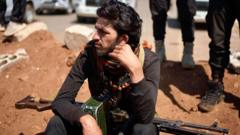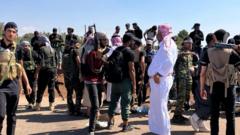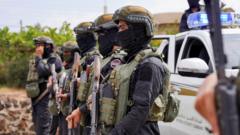The devastating suicide bombing at Mar Elias Church raises concerns over stability in post-civil war Syria, where the threat of extremist violence remains palpable.
Suicide Bombing in Damascus Church Highlights Sectarian Tensions

Suicide Bombing in Damascus Church Highlights Sectarian Tensions
Attack on Greek Orthodox Service Claims 20 Lives, Poses Challenges for New Government
On Sunday, a tragic suicide bombing at a Greek Orthodox Church in Dweila, a district of Damascus, resulted in the death of at least 20 individuals, further complicating the already tumultuous landscape of Syria in the wake of a prolonged civil war. The attack occurred during a church service at Mar Elias Church, where the assailant, armed with an explosive vest, initially opened fire on attendees before detonating his explosives, injuring more than 50 others.
Authorities have indicated that the perpetrator might have connections to the Islamic State, which had previously exerted control over substantial territories in Syria. This incident marks the first recorded suicide bombing in the capital since the change in leadership when a coalition of rebels ousted the entrenched president, Bashar al-Assad, in late 2024.
The new Syrian government has expressed commitment to re-establishing order and has attempted to bolster the reassurance of its diverse religious minorities. However, the backdrop of sectarian strife continues to loom large, with warnings from both U.S. and United Nations officials regarding the potential resurgence of extremist factions in the chaotic post-Assad environment.
Witnesses who experienced the bombing described a scene filled with chaos and despair, as local residents and emergency services rushed to assist the victims. Images from the scene depict devastating damage, including blood-soaked floors and shattered church walls, starkly reflecting the brutality of the attack.
With escalating fears surrounding security and the resilience of extremist groups, the resilient efforts of Syria’s emerging leadership may be severely tested in the days ahead.
Authorities have indicated that the perpetrator might have connections to the Islamic State, which had previously exerted control over substantial territories in Syria. This incident marks the first recorded suicide bombing in the capital since the change in leadership when a coalition of rebels ousted the entrenched president, Bashar al-Assad, in late 2024.
The new Syrian government has expressed commitment to re-establishing order and has attempted to bolster the reassurance of its diverse religious minorities. However, the backdrop of sectarian strife continues to loom large, with warnings from both U.S. and United Nations officials regarding the potential resurgence of extremist factions in the chaotic post-Assad environment.
Witnesses who experienced the bombing described a scene filled with chaos and despair, as local residents and emergency services rushed to assist the victims. Images from the scene depict devastating damage, including blood-soaked floors and shattered church walls, starkly reflecting the brutality of the attack.
With escalating fears surrounding security and the resilience of extremist groups, the resilient efforts of Syria’s emerging leadership may be severely tested in the days ahead.



















